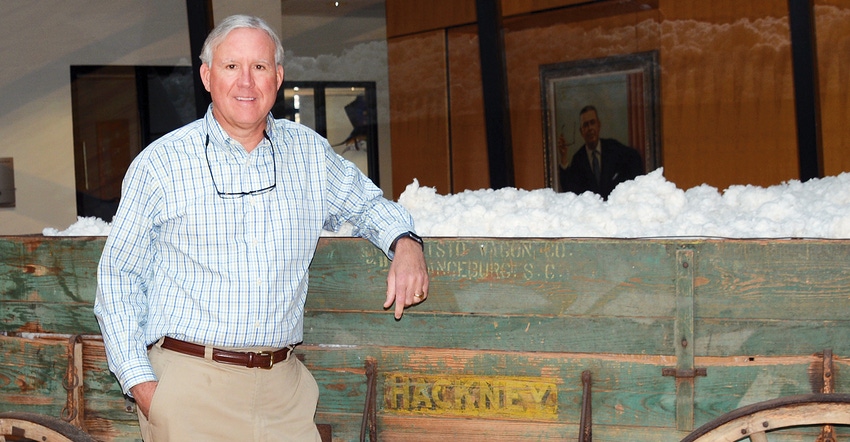
As one of the single biggest users of U.S. cotton, Parkdale Mills is committed to the American cotton industry. “We are, first and foremost, a cotton mill,” says Andy Warlick, president and CEO of the Gastonia, N.C.–based company. “We purchase cotton from the Delta, Southeast, and Texas, and we work closely with gins and farmers to source our mills,.
Parkdale is generally pleased with the quality of the cotton U.S. farmers and ginners provide, he says. “As a natural fiber, cotton is certainly more challenging to spin than man-made fibers, which are uniform and easier to process.
“But with consumers still demanding cotton, Parkdale is dedicated to providing high quality cotton yarns for products ranging from blue jeans to dress shirts to bed sheets.
“Every bale of cotton is different, while every bale of polyester is uniform and just the same,” Warlick notes. “Milling cotton has always been more difficult than milling polyester, but consumers are still demanding cotton, and we’re in business to meet that demand.”
EMPHASIS ON SERVICE
Over the years, many U.S. cotton mills have closed due to stiff overseas competition, but he says, Parkdale has remained in business because of its emphasis on customer service and offering a wide variety of yarns from both cotton and man-made fibers.
“We use all of the major spinning systems: ring spinning, open end spinning, friction spinning, and air jet spinning. We can provide yarns to produce all kinds of finished goods.”
Parkdale is a world leader in the production of knitting yarns, weaving yarns, military yarns, and home furnishing yarns. The company has 28 plants across North America, Central America, and South America.
“As the world’s leading manufacturer of spun yarns, our goal is to deliver customer value through exceptional yarn quality and unparalleled service,” Warlick says. “ Our success is the direct result of our relentless commitment to providing innovative and cost-effective solutions to the driver of our organization — our customer.
Parkdale has remained competitive over the years, he says, because it always innovates, turns to the newest spinning systems, and relies on technological and operational precision to produce high quality yarns. “We have a hard-won reputation for quality.”
ATTENTION TO QUALITY
By and large, he attributes this rigorous attention to quality as the key factor in Parkdale’s success. “We pay strict attention to the needs of our customers — that is key,” Warlick says.
Parkdale also can provide custom yarns and yarns specifically made for a customer’s needs. “By using all of the spinning systems, we can produce any yarn a customer needs for any product,” he says. “Our cotton is tested for fiber properties to meet the individual’s product specifications.”
Parkdale was chartered in 1916 by a group of investors in Gastonia, N.C. Operation began in 1918, producing 425 tons of thread yarn per year in one plant. Fifty years after the company was first chartered, Parkdale Mills Plant #2 opened in Gastonia, doubling the company’s production.
More acquisitions followed, and by 1992, Parkdale was operating 18 yarn spinning plants in the U.S. As acquisitions continued, business strategy turned to construction in the mid-1990s. Over a period of 15 years, Parkdale built nine new plants in the U.S., the latest being the W. Duke Kimbrell plant that opened in Gaffney, S.C., in 2010. An international manufacturing and distribution strategy initiated operations in Mexico, Honduras, El Salvador, Dominican Republic, and Colombia.
In 2008, Parkdale furthered its expansion and diversification by acquiring US Cotton LLC, the dominant supplier to almost every major U.S., Mexican, and Canadian retail chain of private label cotton-based consumer products. These products include swabs, cotton balls, rounds, and square pads.
Today the parent company, Parkdale Inc., through its subsidiaries, processes 60 percent of U.S. annual cotton consumption. It is one of the largest providers of spun yarns in the world, manufacturing over 8,000 tons of products per week at 29 manufacturing plants in the U.S., Central America, Mexico, and South America.
KEY IS BUILDING DEMAND
Parkdale’s customer base in both the Eastern and Western Hemispheres has positioned it to be one of the largest exporters of product out of the U.S.
Parkdale will remain committed to U.S. cotton, Warlick says. His outlook for the cotton industry is mixed, due primarily to the improving quality of synthetic fibers and the fact that the millennial generation isn’t as devoted to cotton as the baby boomer generation.
He tells the story of going into a golf pro shop with a group of customers and cotton farmers, and noticing that the golf shirts for sale were made from polyester, but looked and felt just like cotton golf shirts.
“Synthetic fibers are much better today than they used to be,” he says. “Baby boomers remember polyester that pilled, and the polyester leisure suits of the 1970s. Those days are gone — synthetic fibers are much better now.”
Additionally, the millennial generation doesn’t remember when polyester was uncomfortable to wear compared to cotton. “They don’t have the loyalty to cotton that we do,” Warlick says, speaking of the baby boomer generation that helped fuel’s cotton’s renaissance in the 1980s.
With Parkdale’s continued commitment to cotton, Warlick says, the key is to build demand —which Parkdale is committed to doing. “The best thing that can happen is for people to wear more blue jeans — still the No.1 use of cotton.”
In addition, he says, building demand in the home furnishings market, bed sheets, and towels is vital. “We have to convince the millennial generation to love and demand cotton.”
About the Author(s)
You May Also Like






